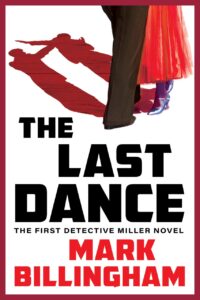I’ve often likened the writing of a crime novel to a stand-up comedy performance and I still believe that they have much in common, for me, at any rate. As a writer of commercial fiction I need to engage my reader quickly. I feel compelled to strive for this, largely because I require that same early engagement when I am reading a novel. It doesn’t need to be a crash-bang-wallop bit of action, a killer hook or an irresistible cliffhanger. Sometimes it’s just a voice or a character; something that teases and draws me in. But there needs to be something in those first few pages demanding that I read on. The same is certainly true when it comes to performing stand-up. Back when I was doing just that, I couldn’t just amble on to the stage at the Comedy Store and say to the audience, “Stick with me folks, I get funny in about ten minutes.”
To be fair, it did usually take me about that long…
There is also a striking parallel in terms of structure, because I’ve always felt that many crime novels – thrillers, certainly – are structured in exactly the same way as jokes. There are set-ups and punchlines and the success of these are dependent on precision timing, on the moments when key information is revealed. The performer/writer misdirects the audience, leading them to think they know exactly what is about to happen before they get hit with a sucker punch from a completely unthought of direction. Think of that stunning moment at the end of The Silence Of The Lambs. The SWAT team descend on the house of the man they believe to be the serial killer, while Clarice Starling is hundreds of miles away tying up a few loose ends. The SWAT team ring the doorbell and we cut to the killer’s lair where he hears the doorbell. That is the moment when the reader is sold the dummy. We follow the killer up the stairs, butterflies flitting around as he approaches the front door. In a moment of unbearable tension, he opens it and…it’s Clarice Starling! The SWAT team are at the wrong house and she – God help her – is at the right one. It’s a stone-cold classic punchline, albeit a rather dark one.
There has always been a degree of humour in the crime novels I’ve written, because there has to be. I simply cannot bear to read or watch anything that doesn’t contain some lighter moments because not only would that be unbearable and bleak, it would be unrealistic in the extreme. Life contains darkness and light. I would actually go further and suggest that it is the very co-existence of these seeming opposites that define human existence. Blimey, this is getting a little heavy…we’ll need a joke in a minute.
Don’t worry, there’s a cracker coming very soon…
So yes, there is some (usually dark) humour in my Tom Thorne novels, but my new book, The Last Dance is the start of a series featuring Detective Declan Miller in which those lighter moments are very much to the fore. Of course, they are used to counterpoint or comment upon grief, pain and loss (all the old favourites) but there are rather more of them than might be found in earlier books. So, apologies in advance but I’ve finally given in to the comedic instincts I’ve been stifling all these years and pushed the boat out, having first filled it with whoopee cushions, stink bombs and Christmas cracker jokes.
To be serious (for a moment, anyway) where there are jokes, I hope that many of them are somewhat more profound than that. I firmly believe that some jokes can be very serious indeed or at the very least, thought-provoking. I’m currently on tour in the UK promoting The Last Dance and as part of my presentation I’ve taken to telling the following joke, which I’ve traced back from Jerry Seinfeld, via Ricky Gervais and David Baddiel, to a prominent Jewish academic.
I did promise you a joke, didn’t I?
A Holocaust survivor finally dies of old age and goes to heaven, where he meets God. The Holocaust survivor says to God, “Can I tell you a Holocaust joke?”
“OK,” God says.
So, the Holocaust survivor tells God the joke.
“Sorry,” God says. “I don’t think that’s very funny.”
The Holocaust survivor looks at God and shrugs, and says, “Oh well, I guess you had to be there.”
Now that’s a joke with a lot going on.
I’m certainly not claiming that The Last Dance is crammed full of jokes quite as profound as that, but I think it neatly illustrates a premise on which the Miller series is based; that humour and seriousness are not mutually exclusive.
I like a silly joke as much as anyone else, but some laughs mean more than others and laughter can serve many purposes. My favourite definition of comedy is one that’s been attributed to everyone from Mark Twain to Lenny Bruce, but has never felt more apposite than it does today.
Comedy = tragedy + time.
It’s certainly true for Detective Declan Miller, laughing through tears as he strives to crack a case that has his colleagues baffled. I hope that the reader will go through a similarly complex range of emotions as they read The Last Dance. Giggling hysterically, their keyboard splattered with teardrops as they email me messages of gratitude and type out their five-star reviews.
Yeah, I know, it’s a big ask.
But…
You don’t ask, you don’t get, right?
***
Featured image: Joshua Reynolds, David Garrick
between Tragedy and Comedy, 1760-61





















